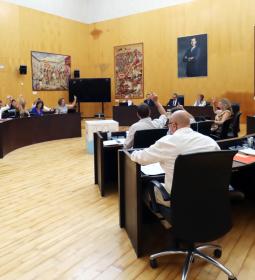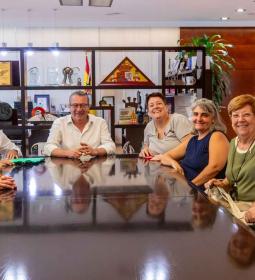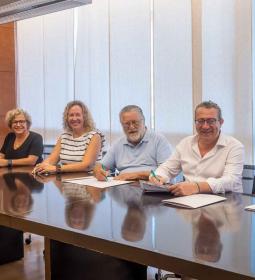The mayor is speaking at a conference on tourism and social, economic, and environmental sustainability organized by the CEOE at the Secretariat of State
Toni Pérez argues that tourism should be a "tool for coexistence and social cohesion"

It highlights the commitment to seniors certified by AENOR through projects such as AI-powered telecare and the Benidorm ICT program for technological literacy, and emphasises tourism's ability to create jobs
The Mayor of Benidorm, Toni Pérez, defended today that tourism should be "a tool for coexistence and social cohesion," as well as for "urban regeneration and cultural projection." Toni Pérez conveyed this message at the conference "Tourism & Sustainability: Building the Future of Tourism," organised by the Tourism Council of CEOE (Spanish Confederation of Business Organisations). The event was held at the headquarters of the Secretary of State for Tourism in Madrid and is part of the project "From Listening to Doing Together, Better Tourism."
Specifically, the mayor participated in panel 3 of the conference, which focused on social sustainability. Therefore, in his speech—which was attended by the Secretary of State for Tourism, Rosario Sánchez—the mayor outlined some of Benidorm's practices and experiences in this area and emphasized how tourism, with good planning and management of natural and human resources, has a positive impact on the region and its inhabitants.
“Beyond figures and occupancy, the true success of a destination is measured by its ability to generate well-being among its residents, foster coexistence, and foster pride in who it is and what it represents,” he stated.
Toni Pérez referred to the social dimension of tourism in Benidorm, emphasising this industry's capacity “to generate employment,” which is “the best social policy that exists.” To reinforce this statement, he noted that in May, the city's unemployment rate stood at 9.24%, the lowest among cities with more than 50,000 inhabitants in the autonomous community.
During his speech, the mayor emphasised that “another important factor is citizen participation,” and advocated for establishing dynamic and participatory lines of dialogue that foster the exchange of ideas and the involvement of civil society in the design of municipal strategies and policies.
He also mentioned municipal programs and resources aimed at serving and improving the quality of life of residents and visitors. At this point, he highlighted that Benidorm has been the first destination in Spain to comprehensively certify, with the help of AENOR, its commitment to older people. This commitment aims to actively combat the unwanted side effects of ageism, a phenomenon that marginalises and excludes the elderly.
Among the 18 commitments to older people that Benidorm has made and already achieved, Toni Pérez selected two "use cases" that "deliver on the Smart Tourism Destination (STD)," which have a clear impact on the resident population and make "social sustainability more visible" and "people understand that we are on the right track."
The first use case presented by the mayor is the innovative pilot project "Telecare Benidorm. Internet of People," which uses artificial intelligence (AI) to detect the needs of elderly or vulnerable people living alone by monitoring their energy consumption. During the five-month testing period, 485 alarms were generated, resulting in 20 successful social interventions. The second project highlighted by the mayor was the "Benidorm TIC" project, thanks to which "a thousand people a year, primarily those over 65, receive courses in digital literacy and adaptation to technology, allowing them to gain independence."
Aside from caring for the elderly, during his speech, the mayor also mentioned programs and plans aimed at the inclusion and integration of the new Benidorm residents" who are settling in the city, which is "an amalgam" of cultures, bringing together 120 nationalities. He then emphasised that "tourism" serves as a "catalyst" for cultural exchange and "promotes an open, tolerant citizenry prepared for the challenges of the future."
Following the mayor's presentation, the panel discussion for the same panel 3 took place, with the participation of Fede Fuster, president of the hotel association Hosbec and ITH (Hotel Technology Institute); Pere Granados, mayor of Salou; and Sonia Velázquez, director of the technical office of the General Secretariat for the Demographic Challenge. Cristina Montalvá, director of Equality and Local Policies for the Spanish Federation of Municipalities and Provinces (FEMP), moderated the panel.
During the day, Benidorm's name was mentioned several times in various panels and presentations as a leading destination in sustainable management, for example, as a leader in regenerative tourism, water reuse, waste treatment and recycling. This management has earned the city recognition from the European Commission as a "Green Pioneer of Smart Tourism" destination in 2025.







